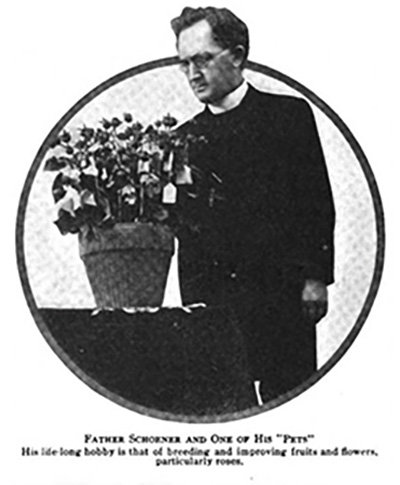An inventor of roses.
Howard, Randall R.. "An inventor of roses." Illustrated World 25, no. 4
(June 1916): 481-482.
[https://library-projects.providence.edu/rosarium/view?docId=tei/rg0078.xml]

Though you might ride on the train through Brooks, Oregon, without knowing it, yet this tiny village has been red-marked by the entire world of science. And all because here was located a humble little country church, where a Catholic priest—Father George Schoener—came to regain his health.
Doubtless there were those who thought that the modest, scholarly clergyman was burying himself in obscurity, when he stored his 7,000-volume library and migrated to the heart of the old French prairie settlement of the lower Willamette Valley. But, on the contrary, it was the handclasp of opportunity—the chance for which he had longed.
Back in Switzerland the young man had varied his study for the priesthood by specializing in botany and geology for two years, but in the crowded parishes of our eastern cities he had found little chance to continue his nature studies. In his new country parish, however, Father Schoener lost no time in classifying the plants of the surrounding fields and woods. Among others he found fourteen varieties of wild rose, and his mind turned to the possibility of perfecting established varieties of roses, and developing new varieties.
Father Schoener’s first experimental garden was his churchyard, every square foot of which was utilized. Then he borrowed a little patch of ground from his blacksmith neighbor, and another from the railroad right-of-way. He became expert in pollenizing and budding. He searched the plant world, not restricting himself to roses, experimenting with other flowers and with fruits and vegetables, in order to learn more about roses.
Though still little known at home, Father Schoener’s name began to be repeated among scientists. He came to be regarded as one of the world’s leading exponents of the Mendel theory of plant evolution. Last year, he imported more than ten thousand rose plants alone. One thousand of these plants were the gift of the English woman, Miss E. A. Wilmott, a world authority on wild roses. Likewise, Father Schoener has been presented with plants by the Canadian Government, and our own Department of Agriculture last spring sent him nearly one thousand different plants, gathered by government explorers in all parts of the world. He has also collected plants from Alaska, from Japan, and other distant lands.
Father Schoener has under development many promising beautiful varieties of roses. One of his most spectacular developments is the Caroline Testout rose with a blossom eight inches across , growing on a sweet briar twenty feet high. From the commercial angle, he believes he can establish rose varieties that will enable the mild Willamette Valley to produce the $4,000,000 worth of rose oil now annually imported from Europe.
Father Schoener has achieved other notable results—for example, his new Willamette berry, a combination of the raspberry and the blackberry; and a combined cherry-plum that seems to have promise for commercial drying. He has developed an evergreen raspberry, by hybridizing a local and an imported Japanese variety. He has combined the wild plum and the wild apricot. A freakish development is his rose-apple—a Spitzenburg apple crossed with a wild rose, resulting in an ornamental tree with bright red fruit very suitable for marmalade and jelly. He is developing a special variety of corn, adapted to local climate. His new garden peas are pronounced delicious, and are eaten hulls and all, like string beans.
A few months ago a fire destroyed the church and Father Schoener’s parish house, and it was essential that he seek new quarters. from among several invitations, Father Schoener accepted that of a committee of prominent Portland citizens, who provided grounds and the financial support that will enable him to devote his entire time to his work.

